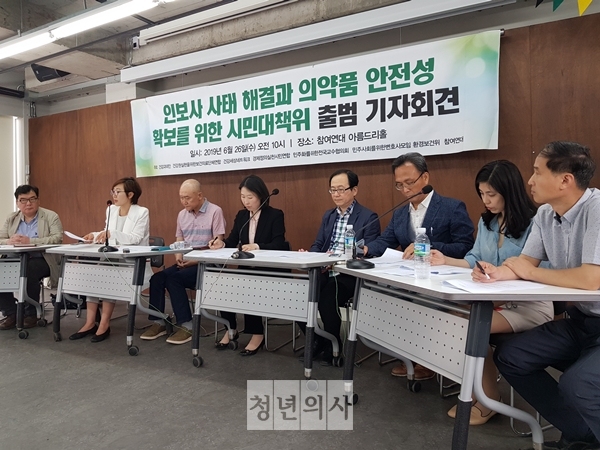“The National Medical Center (NMC), the Korea Centers for Disease Control and Prevention (KCDC), and the National Evidence-based Healthcare Collaborating Agency (NECA) unofficially said to the government that they could take care of Invossa-treated patients. However, the government was silent about it, and the Invossa problem remains unsolved under the management of the Ministry of Food and Drug Safety only.”
The criticism came at a news conference by a member of the “Citizens' Committee for Solving the Invossa Issue and Securing Drug Safety,” launched on Wednesday at the head office of the People's Solidarity for Participatory Democracy in Seoul.

As the public increasingly demanded a thorough investigation of the ingredient mislabeling of gene therapy Invossa and called for comprehensive measures for patients treated with the drug, civic groups formed the committee composed of physicians, legal experts, and patients. The committee urged the government to resolve the situation actively.
Baek Han-joo, a professor at the Rheumatology Division at Gil Medical Center, said victims of Invossa shots should not be categorized by the standards suggested by the food and drug ministry.
“Invossa-treated patients should be regarded as victims of a potentially toxic substance. We need comprehensive medical care for them,” he said. “This is beyond the capabilities of the food and drug ministry. The Health and Welfare Ministry should manage this issue.”
The food and drug ministry’s follow-up on Invossa-treated patients is monitoring of side effects, usually conducted on an authorized drug with no issue in safety and efficacy. Such tracking is inappropriate for patients whose injections contained unidentified substance (the second fluid of Invossa), Baek said.
The professor demanded a patient-centered medical support system that can check patients’ physician and mental damage, MRI and follow-up tests, and GP2-293 kidney-derived cells and viruses in the joint fluid and blood. The support should also include a comprehensive medical and epidemiological investigation and health impairment of the patients, he added.
Kim Byung-soo, a professor at the Catholic University of Korea, said, “Invossa was the first case in the world to inject 293 cells into the human body. This should be studied.”
The Citizens’ Committee said other healthcare agencies under the health and welfare ministry were willing to do cohort analysis on Invossa-treated patients, but the ministry declined to cooperate.
Woo Suk-kyun, co-president of the Association of Physicians for Humanism (APH), had unofficially said the group would care for patients who received Invossa treatment.
“KCDC reportedly said it could handle the cohort analysis. NECA said to the government that it could investigate on Invossa’s side effects. However, I don’t know why the government is still quiet,” Woo said. “Handling this issue is limited only to the food and drug safety ministry. This is why we can’t have a comprehensive plan for the patients.”
Three months have passed since Invossa was first suspended due to the ingredient labeling error, but it is still unclear in which stage cancerous 293 cell lines were injected into Invossa.
“We have to know exactly if the cells in the second fluid of Invossa are 293 cells for viral production, or 293 cells intentionally transduced, or just 293 cells, or unidentified cells. Then, we can track down at which stage the mixing and the manipulation occurred,” Professor Kim said. “To reveal what happened, the prosecution should do its analysis of the cells of the second fluid.”
The citizens’ committee said it was conducting an epidemiological study on a small group of Invossa-treated patients. Once the committee collects enough data, it will announce the results, it said.
Woo urged the government to come up with a comprehensive plan for over 3,700 patients who received Invossa treatment.
The food and drug safety ministry is scheduled to make the final ruling on the revocation of Invossa license within this month.

